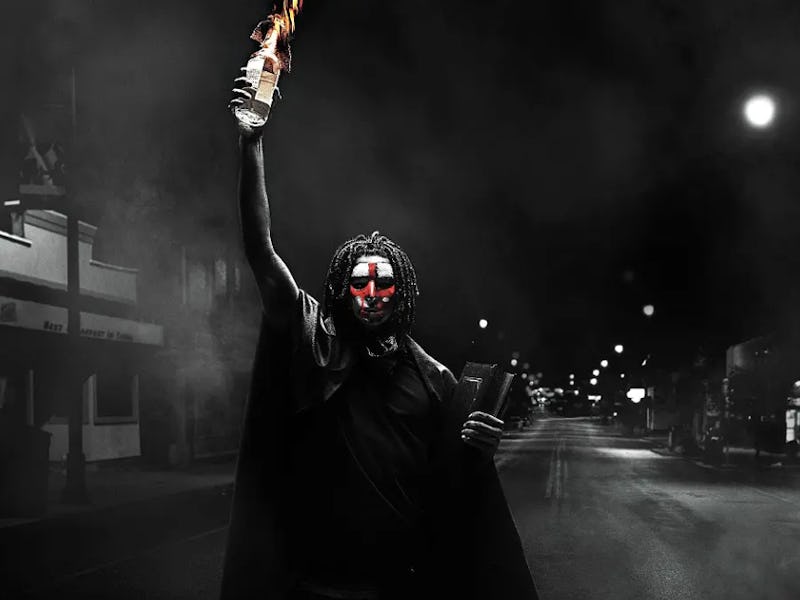The Purge Movies Took a Huge Risk in 2018 — And It Worked
With a new director and a surprising twist, the franchise’s fourth entry goes places you don’t expect.

The Purge’s portrayal of an America so consumed with anger that it transforms into a state-sanctioned apocalyptic hellscape has always been political. But as series creator James DeMonaco told Inverse in June, exactly 10 years after The Purge first debuted, “My mindset infected the films deeply as I grew angrier and angrier at the politics that were unfolding inside the country.”
The Purge franchise expanded from a humble home invasion story to tackle presidential politics, immigration, and the threat of a new American civil war, all fueled by DeMonaco’s growing anger at the state of the world. But one entry in the series stands as a high point, at least when it comes to channeling that rage into a coherent and powerful political message.
The First Purge (technically the fourth movie in the Purge saga) arrived in theaters five years ago on July 4, 2018 (subtle). As the title suggests, the film acts as an origin story, but more importantly, it retcons the entire franchise into a potent story for the Black Lives Matter era.
The First Purge takes place on Staten Island, where the U.S. government, under the control of the nefarious New Founding Fathers of America party, is testing out its promise of a single night with no laws. Lower-income residents are offered $5000 to stick it out, while the wealthy flee to safety. But when the Purge begins, almost no one takes the bait. Aside from some light burglary and one psychotic serial killer named Skeletor (played to perfection by Rotimi Paul), everyone is happy to party in peace.
But the New Founding Fathers can’t allow the Purge to fail. The government sends in a secret military unit to start shooting, sparking a last stand between the mostly Black locals and an invading white force. From there, it’s a race to the finish as the horror franchise dips its toes into the action genre.
Rotimi Paul as Skeletor, the only guy who actually enjoys the Purge.
James DeMonaco has the only writing credit for First Purge, but after directing the first three, he handed that responsibility to Gerard McMurray, who was best known for The Burning Sands (a drama about hazing at a Black fraternity). McMurray’s influence is all over the film, as he confirmed in interviews.
“It was important to me to really try to find my voice and try to make it feel like this was Gerard McMurray exploring this world,” the director told Daily Dead. “And exploring the experience of the black man on Purge Night... Because of everything going on, there’s so much political and social commentary you can make with this story and have it reflect the world right now, and I felt like that was important.”
Jason Blum, the CEO of the horror-focused studio Blumhouse, also had a hand in guiding the prequel.
“Jason Blum added a lot,” McMurray told SlashFilm. “He was the one that brought me in to do the film. Definitely he wanted political stuff. He’s like me, he likes to push boundaries. You see the KKK stuff. Anything that came up, like Charlottesville happened while we were making the film. So that came up and I’d say, ‘Jason, can we do that thing?’ He said yes.”
Lex Scott Davis and Joivan Wade in The First Purge.
Each Purge movie has its own spin and its own message, but The First Purge stands apart as the only entry to almost completely ditch the artifice of genre. While other Purge movies can only do so much within the confines of a dystopian thriller where violent criminals run the streets in scary masks, First Purge strips that all away by going back to the night when it started.
This is a movie set not during or after the apocalypse, but right on the precipice. It’s a world that still feels recognizable. That’s what makes it so scary, and also what makes it so powerful.